► Which hybrid SUV should you buy in 2025?
► CAR picks the best hybrid crossovers
► Our favourite low-tax family-friendly cars
If you’re looking to buy or lease a new family car in 2025, you’re going to want to know about the best hybrid SUVs. Fuel-saving, pollution-reducing hybrid technology is available in all kinds of car now, but for most families a hybrid SUV is probably close to the top of your list. Imposing, spacious – and sometimes even stylish – they’re often the most practical option if you’re moving a few people around.
The best hybrid SUVs at a glance
With the latest slew of clever electrified technology, the best hybrid SUV can give you all the performance potential you could want, along with lower running costs than you’d associate with a regular petrol SUV. Choose a plug-in hybrid, and that big 4×4 could be less polluting for short trips than the smallest supermini.
EDITOR’S PICK: CAR magazine’s panel of road testers have driven every hybrid SUV on sale in the UK, but if we had to pick just one, it’d be the BMW X5. Why? It’s fast, fun and is capable of around 50 miles of electric-only running in the real world. It’ll even do 35mpg with a flat battery.
The best hybrid SUVs in 2025
BMW X5 xDrive 50e
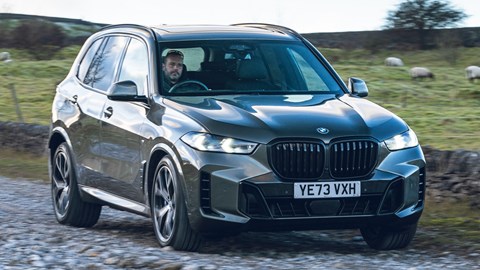
Best all-round hybrid SUV
Pros: Performance, efficiency, EV range
Cons: Less user-friendly cabin post facelift
We were big fans of the outgoing X5 45e, and the post-facelift 50e is even better. It feels much livelier in electric mode, and even in the depths of winter can travel nearly 50 miles in the real world. Overall power is up, too, dropping the 0-62mph time to less than five seconds.
It’s not quite as good to drive as the Cayenne, but you’ll still have plenty of fun behind the wheel. It’s well-built inside, practical and is well equipped with an exceptionally long options list. Our only gripe is that you no longer get physical controls for the stereo and heater.
Ford Kuga Hybrid and Plug-in Hybrid
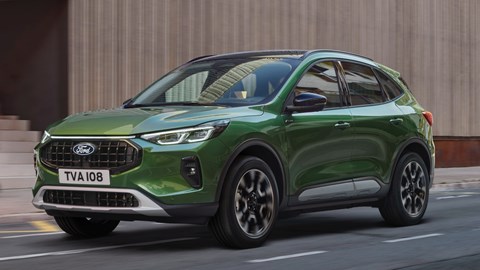
Best for towing on a budget
Pros: 2100kg towing limit, HEV or PHEV, more range and power after facelift
Cons: Small boot, reduced button count post facelift
Ford’s third-generation Kuga SUV has several hybrid options on top of a regular petrol. The self-charging hybrid makes sense if you can’t plug in, and is now available with four-wheel drive. Plug-ins are front-drive only, with range and power increasing after a 2024 update.
Nimble handling and plenty of flexible space will appeal to family car buyers who enjoy driving, but the 42-mile range of electric driving will appeal to the thrifty among us. Even better, it’s seriously frugal even with a flat battery, which is not a given for many plug-in hybrids.
Honda CR-V
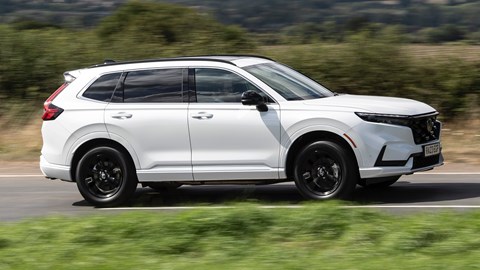
Best for long-distance efficiency
Pros: Excellent economy with flat battery, smooth hybrid system, PHEV unusually has biggest boot
Cons: So-so performance, rivals are cheaper
Many plug-in hybrids are surprisingly thirsty with a flat battery, something you can’t accuse the CR-V of. Honda claims it’ll do 45mpg running on petrol, but we managed even better than that. It’s also far smoother than the majority of rivals as there are no gears to speak of.
Instead, the engine acts as a generator for the electric motor and only drives the wheels directly at motorway speeds. Oddly, it’s the PHEV that has the bigger boot, and there’s no tiny fuel tank, either. With a light right foot and a fully charged battery, 500 miles of range should be possible.
Land Rover Defender P400e
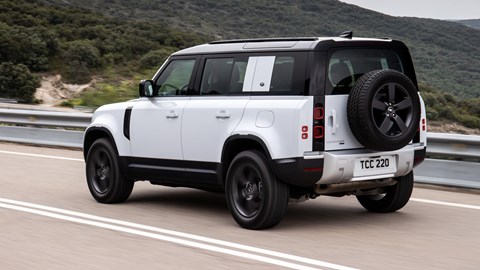
Best for the off-road enthusiast
Pros: Great off-road, quick, spacious interior
Cons: Only 27 miles of EV range, thirsty when flat
One of the most desirable SUVs has a plug-in hybrid powertrain option. Sure, it’s in a higher benefit-in-kind company car tax band than most of the other SUVs here, but it’s still astonishingly good for something this chunky and off-road focused.
There’s still good performance in the P400e as it produces 398bhp, although the electric-only range isn’t great, and neither is fuel economy with a flat battery. Crucially though, it retains its utilitarian chic interior and the star quality associated with Land Rover’s rugged model.
Porsche Cayenne Turbo S E-Hybrid
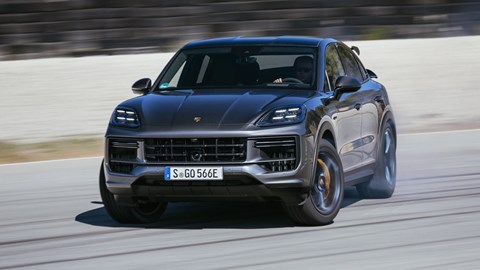
Best for driving thrills
Pros: Ridiculously fast, sharp handling, V8 rumble
Cons: Lesser E-Hybrids are more efficient and more nimble
The Porsche portfolio has grown massively in recent years, and this Cayenne Turbo S E-Hybrid is a case in point. The Cayenne Turbo S E-Hybrid is marketed by Stuttgart as a sports SUV, and has the specs to match, as well as the alternative five-door Coupe bodystyle option.
It uses a 729bhp PHEV powertrain delivering impressive performance: 0-62mph takes 3.7 seconds and a top speed of 183mph. There’s also an optional GT Package that sharpens the handling, although the lesser S E-Hybrid feels lighter on its feet and is still fast enough for most.
Dacia Jogger Hybrid
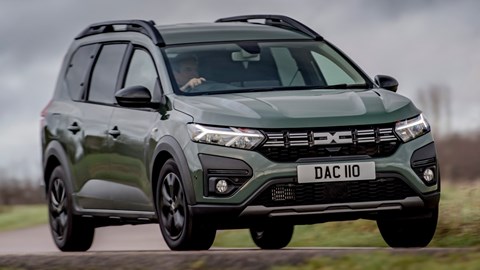
Best for families on a tight budget
Pros: A genuine seven-seater, low price, frugal
Cons: Not the smoothest hybrid, low driving position
The Dacia Jogger gives you a practical seven-seat family hybrid SUV for the price of a supermini. That in itself is quite an achievement and certainly worthy of a place on this list. However, it’s also pleasant to drive and punchier than the regular petrol Jogger.
Fold or remove the third row seats – thankfully they only weight 10kg each – and you have a giant boot that dwarves many of the much larger and pricier SUVs on this list. There’s no plug-in option, but the self-charging hybrid system is good for over 50mpg without breaking a sweat.
Mercedes-AMG GLC 63
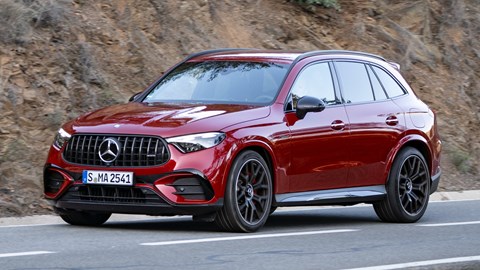
Best for acceleration
Pros: Sharp handling, still reasonably practical, rapid acceleration
Cons: No V8 rumble, tiny EV range
AMG does plug-in hybrids a little differently. The battery is tiny, with a real-world range of around 6 miles, with the focus being on rapid charging and discharging on the move to enable a maximum of 671bhp. 0-62mph takes just 3.5 seconds, making it even faster than the Cayenne Turbo S E-Hybrid.
There’s a highly-tuned 2.0-litre turbo under the bonnet and loads of clever chassis tech. This helps it handle like a much lighter SUV, with oversteer on the menu should you desire. It’s great when you’re hammering along, although you can’t help but miss the old car’s bellowing V8.
Toyota C-HR Hybrid
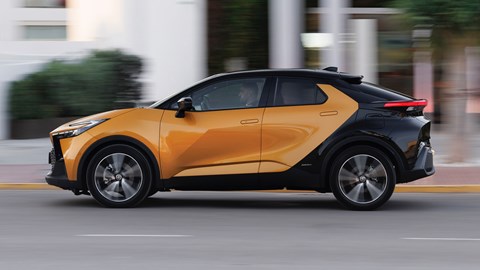
Best for cutting an urban dash
Pros: Efficient, reliable, distinctive
Cons: Still not the most practical choice, could be more fun
The C-HR packs the Prius’s hybrid powertrain into a more zeitgeisty crossover bodyshell. It’s far from a dull old Toyota, with interesting styling inside and out, plus the lure of impressive efficiency. Both self-charging and plug-in hybrid powertrains are available, and it’s a lot more plush this time around.
It’s a bit sharper to drive than its predecessor, although don’t expect much in the way of involvement. What you will get is one of the most reliable cars in this list and urban fuel economy so good, it’ll make your head spin.
Lexus LBX
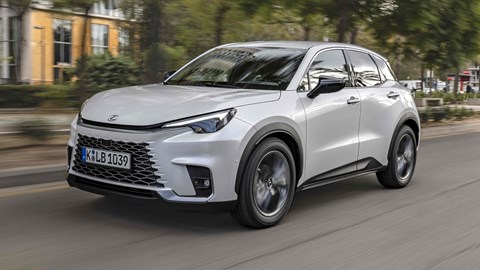
Best for a posh interior in a compact package
Pros: Luxury interior, efficiency, reliability
Cons: Not that quick or fun to drive
If you do most of your driving in cities, and you want something bijou but a bit posh, may we present the Lexus LBX. It won’t set any speed records and it’s certainly no corner-hungry machine, but it will transport you around town in possibly the plushest compact hybrid SUV interior around.
Not only does it get a plusher and better equipped interior than the Toyota Yaris Cross it’s based on, it’s a bit quicker and more refined, too. Expect it to be dependable for many years to come, and like the CH-R, there’s a 10-year warranty if you get it serviced at your Toyota/Lexus dealer.
Range Rover P460e
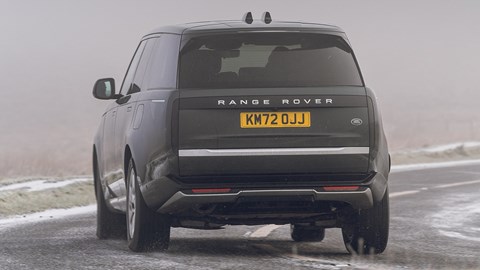
Best for luxury
Pros: Long EV range, comfy, no loss of boot space
Cons: Underslung battery reduces brake-over angle
The latest Range Rover PHEV marks a bit step on from its predecessor. Gone is the wheezy cylinder engine and limited EV range, replaced by a smooth six-cylinder and enough battery for well over 40 miles in the real world in winter. It also shares the many positives that make us such fans of the petrol and diesel models.
There are two power levels to choose from, but the base 460e is plenty quick enough given the relaxed driving experience. The electric motor now delivers over 200bhp on its own, so it’s much livelier than the outgoing P440e and P510e running on volts alone.
Read our full Range Rover review here
Range Rover lease Deals VIEW OFFER
Volvo XC90 Recharge
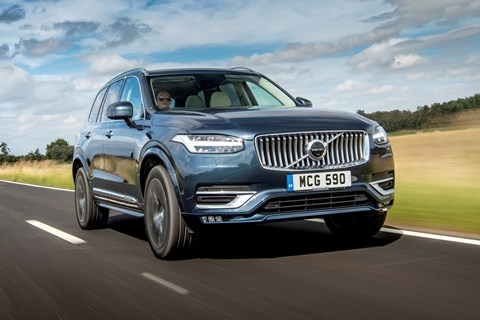
Best for those wanting seven seats, hybrid tech and a bit of luxury
Pros: Plush interior, performance, space
Cons: Nearly a decade old
Even after a good few years on sale, the XC90 is still the only plug-in hybrid SUV to combine a premium badge and luxurious interior with seven seat versatility. With the third row folded away, there’s a vast amount of boot space, too.
Updates to the battery and engine have kept it relevant in its twilight years, improving the electric range and efficiency. It also boosted overall power to 449bhp, and gave it usefully more poke in electric mode as well.
Read our full Volvo XC90 review
Volvo XC90 lease Deals VIEW OFFER
Hyundai Santa Fe PHEV
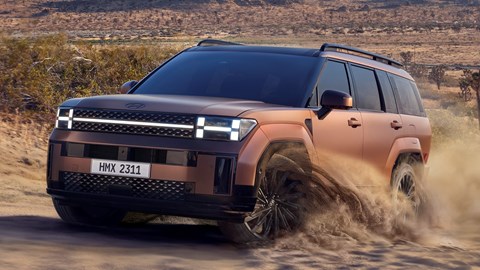
Best for those that like angles
Pros: Capacious third row, quality interior, comfortable
Cons: Performance isn’t as competitive as some, and the looks won’t be for everyone
Believe it or not, the Santa Fe still shares a platform with the Kia Sorento. The Hyundai’s update is a lot bolder than Kia’s, yet it still has the familiar 1.6-litre turbocharged petrol engine mated to a plug-in or self-charging hybrid system. Six or seven seats are available.
The plug-in hybrid is the punchier option, although let’s hope the EV range and efficiency has been improved for this generation. Even if it hasn’t, the massive third row space still makes it a tempting choice.
Read our full Hyundai Santa Fe review
Hyundai Santa Fe lease Deals VIEW OFFER
Why a hybrid car?
Hybrids represent an increasingly popular stepping stone between the best electric cars and the best petrol ones. Boasting many of the benefits of a BEV (Battery Electric Vehicle), hybrid powered
SUVs can deliver inexpensive and silent running in town, but without the range restrictions of an electric-only alternative. That makes them great for skating around to the shops, or for longer hauls such as staycations or road trips.
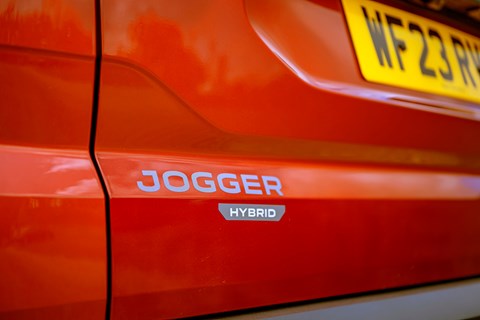
Hybridisation brings other benefits, too: some hybrid SUVs deliver cheaper running costs than their ICE-only counterparts, while the fastest hybrid cars use their electric power specifically for a boost in performance. We’ve added a mixture of the two in our list of best hybrids above.
If you’ve got a family, we’d recommend looking specifically at our guides to the best family hybrid cars and the best hybrid estate cars.
We also have a handy guide explaining the pros and cons of a hybrid car.
What’s the best small hybrid SUV on sale in 2025?
Hybrid SUVs combine incredible practicality with low running costs – but what if you don’t need the space? Hybrid cars come in all shapes and sizes now, and that means there’s also a huge range of smaller hybrid cars to choose from in 2025. From the Toyota Yaris Hybrid to the Mini Countryman PHEV, there are several impressive machines on the market today. To make things easier we’ve rounded up the best ones in our best small hybrid car guide.
What’s the biggest hybrid SUV?
If a normal hybrid SUV doesn’t offer enough space, it’s worth checking our guide to the best seven-seater hybrid cars.
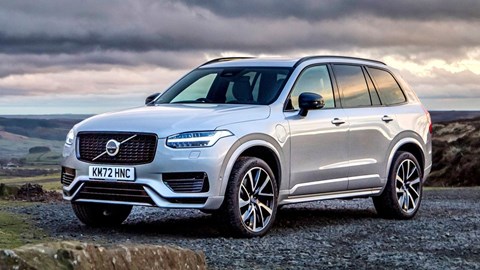
How to make the most of driving a hybrid SUV
Now you’ve seen the best hybrid SUVs, it’s worth considering how you drive and what your family and work demands are. They all have lower CO2 than their petrol or diesel equivalents, so for company car drivers the benefit-in-kind is much lower, and they will be better placed for future emission-based taxation or restrictions on town and city centre driving.
In real terms, however, many of them are much closer in fuel economy to the petrol version if you use them for longer drives and don’t plug them in often. Here are some of the things we’ve learned while testing hybrid SUVs.
- If you do school runs, shopping trips and commuting that’s just a few miles, the hybrid SUV will be much kinder to the environment. Cars with petrol or diesel engines produce the worst emissions when cold and queuing in traffic, particularly if there’s a lot of acceleration and braking. The electric motor in a hybrid is perfectly suited for these conditions – as long as you always charge the battery overnight.
- If your hybrid SUV can be scheduled to pre-condition in winter or summer while it’s plugged in, make use of that feature. Particularly in winter, your battery will go much further if the car has warmed up and defrosted using mains power before you need it. It’s more convenient than scraping ice from windows in the bitter cold, too.
- For long journeys, take advantage of congested bottlenecks and 40-50mph traffic to use ‘charge mode’ and top the battery up (if the car supports it). It’s the time when you’ll notice the least impact on consumption.
- If you do longer journeys, say over 20 miles, daily and can’t plug in at your destination, a self-charging hybrid will give you better running costs.
- If you plug in regularly for lots of short trips, then suddenly need to do a long journey, don’t forget the car will need petrol…
Given the popularity of larger, heavier cars for routine driving in the 21st century, the hybrid SUV is probably the best solution for most families now, with the potential to have the biggest impact on emissions if used correctly. If an electric car isn’t for you but you want to be ‘greener’, this is the next best thing.
Alan Taylor-Jones is the New Cars Editor for the Bauer Digital Automotive Hub, working on both CAR and sister title Parkers. When not driving the latest cars you can find him busy with a young son or playing with RC cars.